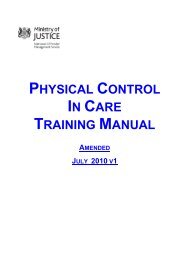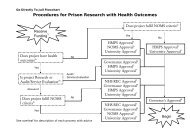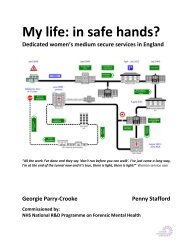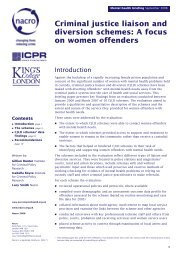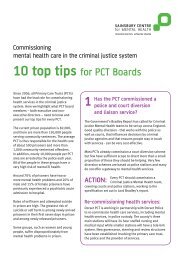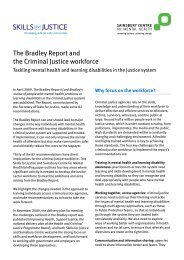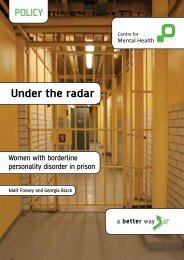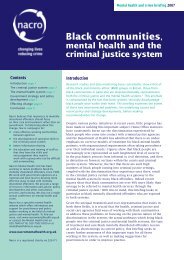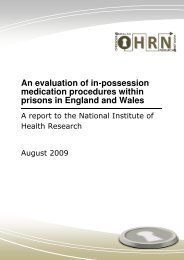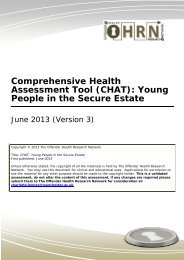Engendering Justice - from Policy to Practice - The Fawcett Society
Engendering Justice - from Policy to Practice - The Fawcett Society
Engendering Justice - from Policy to Practice - The Fawcett Society
- No tags were found...
You also want an ePaper? Increase the reach of your titles
YUMPU automatically turns print PDFs into web optimized ePapers that Google loves.
that VAW is a relevant issue for every department. <strong>The</strong>2007 independent review of the Government’s VAW workrevealed that many departments just do not recognise therelevance of VAW <strong>to</strong> their remit. <strong>The</strong>re is a legal requirementunder the Gender Equality Duty <strong>to</strong> promote change -each department is required not just <strong>to</strong> have due regard<strong>to</strong> the need <strong>to</strong> eliminate unlawful sex discrimination andharassment but also <strong>to</strong> promote gender equality betweenwomen and men. This requires recognition of VAW as amanifestation of gender inequality and a consideration ofthe impact of policies on VAW.Important developments such as the Cross- GovernmentAction Plan on Sexual Violence and Abuse (April 2007); theNational Domestic Violence Delivery Plan; the ProstitutionStrategy (January 2006); Tackling Violent Crime Action Plan(February 2008); and the UK Action Plan on Trafficking (23March 2007) have all been welcomed by the Commissionover the past two years. However, the VAW Strategypresents the opportunity <strong>to</strong> integrate work rather thanthe current fractured approach. This will allow for theprioritisation of a comprehensive funding strategy for theprovision of services for women who have experiencedviolence and will also enable the intersection betweenviolence against women and other inequalities, such asethnicity, age, sexuality, social class and religion, <strong>to</strong> beidentified.<strong>The</strong> Commission was also encouraged <strong>to</strong> see thepublication of a strategy paper by the Conservatives inDecember 2008. 111 This demonstrates that VAW is beingrecognised as an important issue across the politicalspectrum.<strong>The</strong> Police – Reporting &InvestigationIt is clear that at the highest levels of the police force,there is recognition of the need for changes in practiceand in some areas of the country, police investigation hasmarkedly improved in recent years. However, there remainsa need for consistency in investigation across police areasand more importantly, a shift in attitudes and culture.<strong>The</strong> Decision <strong>to</strong> ReportIf victims do not have confidence that the criminal justicesystem will provide them with support, safety and justicethen they are unlikely <strong>to</strong> make the decision <strong>to</strong> report anoffence.Evidence shows that women may choose not <strong>to</strong> reportdomestic violence <strong>to</strong> the police either because they feelexcluded <strong>from</strong> the criminal justice system by virtue oftheir gender, ethnicity or class, or because they doubt theefficacy of this route for dealing with domestic violence. 112Vulnerable and intimidated women, particularly <strong>from</strong>marginalised communities, may also feel a mistrus<strong>to</strong>f authorities or pressure for violence, particularlywithin the domestic context, <strong>to</strong> be resolved within theircommunity. Additionally, women who are trafficked forsexual exploitation or domestic labour may be prevented<strong>from</strong> reporting their situation because of barriers suchas restrictions <strong>to</strong> their movement, intimidation, a lackunderstanding of the UK legal system and languagedifficulties.Crimes of rape and domestic violence have particularlylow reporting rates. On average, it is estimated that just10 percent of survivors who are supported by Rape CrisisCentres report their experience(s) <strong>to</strong> the police. 113 Womenin domestic violence situations often fear retaliation <strong>from</strong> theperpetra<strong>to</strong>r for themselves or their children, have difficultiesleaving the abuser because of financial dependence or fearbeing judged or even blamed by the authorities or society.As one woman <strong>to</strong>ld the Commission:Domestic violence is not a one off event and yet the policereact on what they see at the time. I felt the police saw itas 50:50 when I was being terrorised on a daily basis…it is easy for a charming perpetra<strong>to</strong>r <strong>to</strong> get two blokes ‘onside’,she’s always nagging and so many people includingpolice officers buy in<strong>to</strong> this being a legitimate excuse forviolence. 114<strong>The</strong>re should be continued evaluation of the impact ofthe Domestic Violence Crime and Victims Act 2004 <strong>to</strong>ensure measures do not have a detrimental effect onreporting rates. For example, the criminalisation of breachof non-molestation orders may lead <strong>to</strong> women being lesswilling <strong>to</strong> lodge a complaint against a violent partner. APage 47



